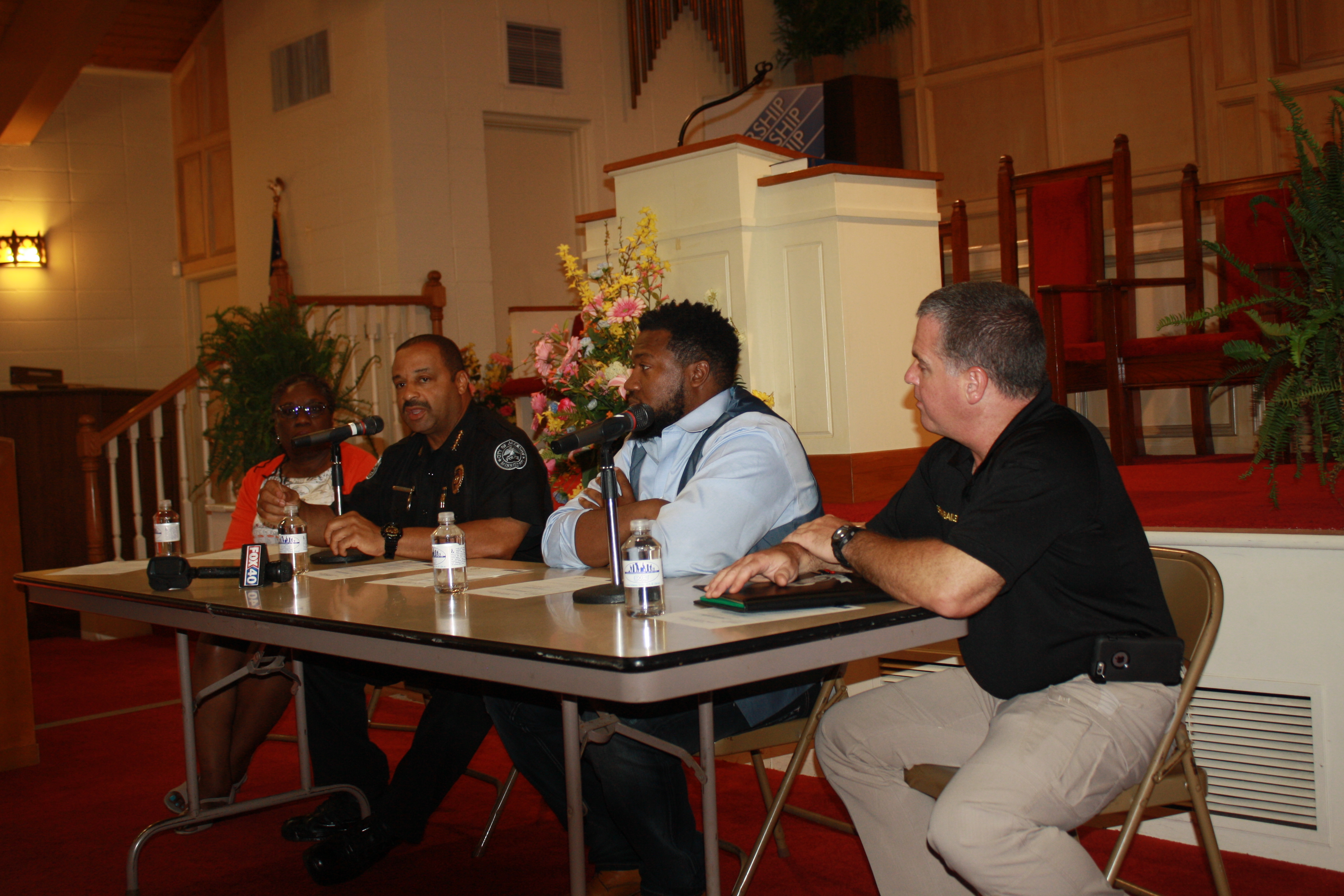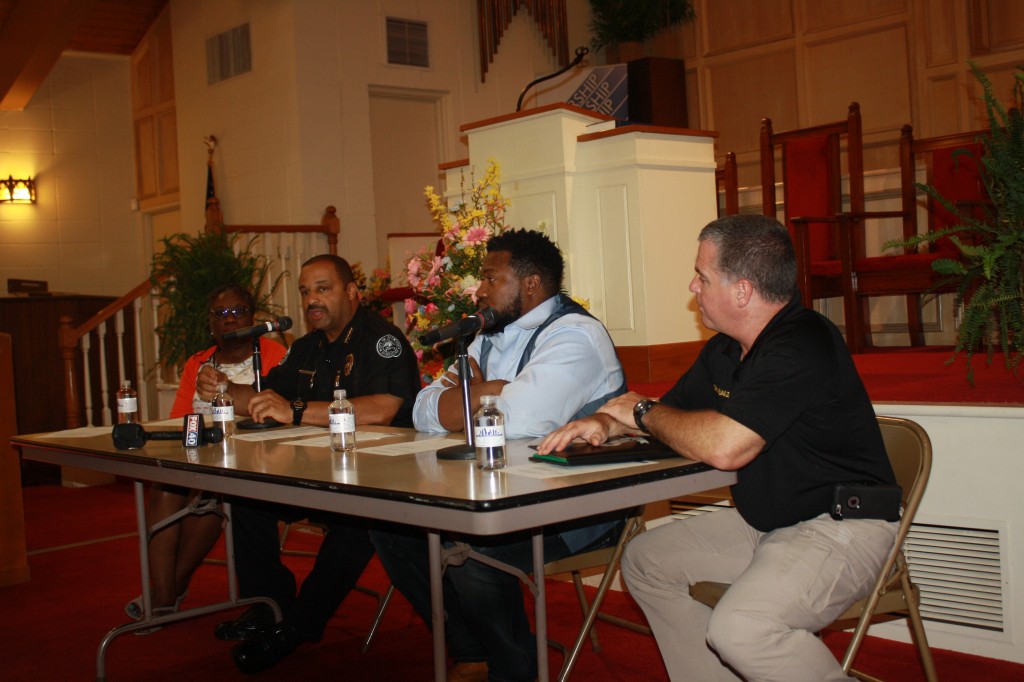

By Shanderia K. Posey
Editor
No one professes to have all the answers regarding recent police shootings across the nation, but many organizations and individuals are making their voices heard on the topic.
Recently, the Mississippi State Conference NAACP and Mount Helm Baptist Church held an open dialogue of community leaders to address the issue.
Elayne Hayes Anthony, dean of Jackson State University’s School of Journalism and Media Studies, was the moderator of the panel discussion titled “Searching for Shalom: Keeping Faith and Seeking Justice. Where Do We Go From Here?”
Panelists were C.J. Lawrence, attorney for the Jonathan Sanders family; Bryan Bailey, Rankin County sheriff; Safiya Omari, associate vice president for Research and Sponsored Programs Division of Research and Federal Relations at JSU; and Lee Vance, Jackson Chief of Police.
“What I’m hoping that we will do tonight is find ways to continue the conversation,” said Anthony, noting that sometimes the media only gives attention to topics as they happen. “We can’t afford for this just to be a story that happened in July of 2016 and that we impact that story when we are doing roundup stories at the end of the year. It’s too important for that. This is a situation that affects all of us. We’ve got to learn to solve conflicts in a way other than violence.”
In his overview of JPD policies, Vance touched on why police officer shootings “rock the world.”
“It’s because the expectation of police officers is higher than the average citizen,” he said. We are supposed to wave the banner of justice, the banner of service, the banner of professionalism, so that’s the difference between what happens with us and when John Doe kills John Smith.”
Vance also noted in the United States there is not a national police service that conducts local police service. There are thousands of police jurisdictions operating independently across the nation.
“So I get offended,” Vance said, “when the rhetoric is minimized to say that ‘police are doing this, police are doing that.’ I’ve never even been to Minnesota. So I do think that one of the solutions is these situations must be localized.”
By “localized” Vance explained that when hostilities arise in communities, those communities must work on their specific issues.
When officers are involved in shootings, systematic events occur such as internal investigations and criminal investigations. The latter, he admitted, has been a source of criticism since D.A. offices work with police officers.
Community oriented policing concept is in place at JPD. “All that is, is an attitude change,” Vance said. “We understand that in 2016, law enforcement must be seen in these communities doing more than enforcement.”
And for those officers who find themselves on the wrong side of the law, Vance said, “Police officers who commit crimes are of no value to me. I don’t want them on my force.”
Lawrence who is familiar with Vance’s community oriented policing efforts, emphasized the lack of uniformity of policing standards in the nation is a problem. “That’s something that needs to be looked at; some of the successful ones and the unsuccessful models.”
Lawrence also shared his thoughts on unnecessary stops by police.
“One of the things we need to look at in this country is minimizing the concept of what we call ‘broken windows policing,’” Lawrence said. Essentially, when police officers stop individuals for something like a broken taillight “because it could lead to their death.”
This was the case with Philando Castile’s police shooting death in Minnesota, July 6.
Unnecessary stops by police is also an issue in the Sanders case. According to Lawrence, Sanders was riding his horse around 10 p.m. in Sunflower County in July 2015. He was tailed by an officer and stopped. “He was essentially choked to death before three eyewitnesses,” Lawrence said, who could’t elaborate much more because of a civil pending case. However, he did say, “You can’t speed on a horse. There’s no crime for riding a horse at night and certainly, none that should have resulted in a public execution.”
Omari, a long-time community activist once arrested by a Los Angeles police officer, addressed how differences in cultures can strain relationships with police. There are two kinds of culture, she said. “There’s the culture within an institution and there’s the larger culture in which that institution exists.”
Omari shared how her past experience as an activist would have never found her sitting on a panel with a chief of police and being good friends.
“That’s because the culture of the Jackson Police Department reflects the culture of the people that they serve,” she said, noting how Vance went to school in Jackson and a lot of the JPD officers know the people in the community.
“Their humanity is not in question because we all come from the same places,” she said. To stress effects of community oriented policing, Omari shared that while living in Boston, Mass. the police department implemented community oriented policing and gang violence decreased.
“Something like 40 percent in a period of three years. Why? Because they required their police officers get out in the streets, walk beats, know the community that they were serving. When crime happened, people in the community didn’t see police as separate and apart from them. They saw them as protectors and defenders, so they went to them and told them.”
When the police come from “a different culture that does not validate the culture of the people they are policing” problems occur, she said, noting that not understanding someone else’s culture leads to bias and fear of others. “If you are afraid of the people who you are supposed to be protecting and serving I would suggest you find another occupation,” she said.
Bailey was asked to discuss realities that impact communities, but before speaking, one of his deputies, Fletcher Trask, who is African-American, shared a story of being stopped three years ago by Rankin deputies. Essentially, it was a case of racial profiling. One officer asked him what he had been smoking. After giving the officer his license, Trask was questioned on the direction in which he was traveling. Then the officer became adamant that Trask looked like he had been smoking drugs.
“He said, I tell you what. I’m gonna pull you out of this car and take you to county jail and you can take a pee test,” Trask said of the officer. When the second officer approached the vehicle and asked “Who you got over there?” he recognized Trask and told the other officer to let him go.
When the incident was reported to Bailey, he scheduled a meeting with Trask and his mom. Those deputies no longer work for the department.
Trask began studying criminal justice in college and was later asked by Bailey to come work for the department. Now Trask is a patrol officer.
“That’s embarrassing to me as the sheriff of Rankin County to have one of my officers treat someone that way,” Bailey said. Of his 90 deputies and 216 employees, Bailey said he would want them each to handle situations exactly the way he would, but because people are individuals they will not. That’s why policies are procedures are vital.
“What I want everyone to understand is that police officers have been in the news lately but how many professions have bad apples in them? Every one has bad apples,” Bailey said.
He tells his officers to treat everyone nice unless they give you a reason not to.
“And, don’t put a color with anything. If they are going to be a piece of junk, don’t let it be white or black, just let ‘em be a piece of junk.”
Shanderia K. Posey can be reached at sposey@mississippilink.com.

Be the first to comment